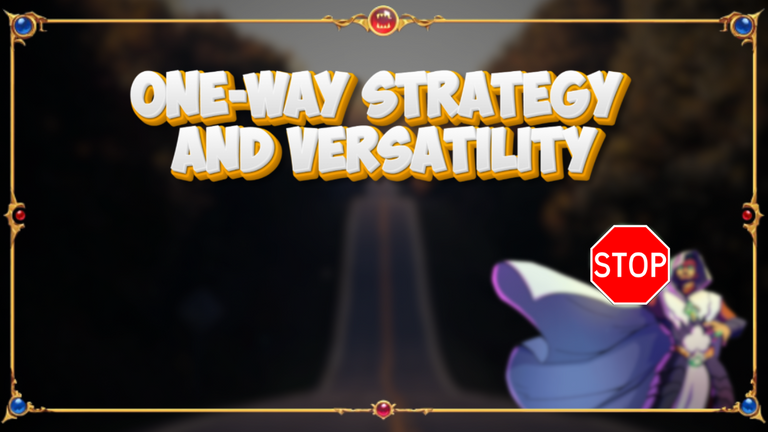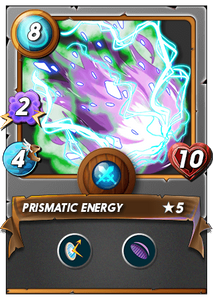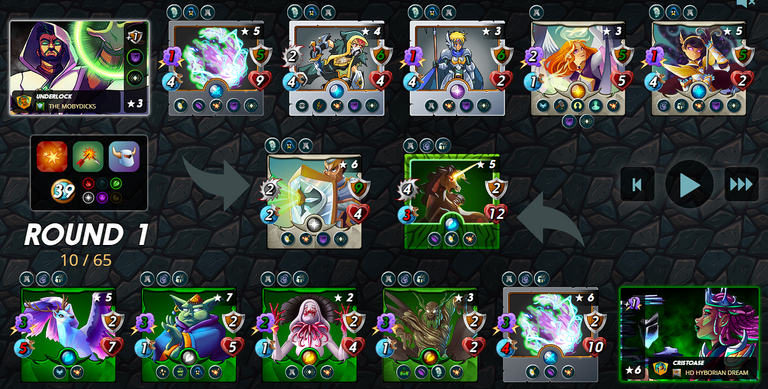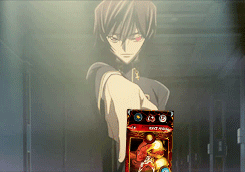
Click here to English Version.

Durante os 3 minutos que nós temos para criar um time no Splinterlands pode ser difícil pensar em tantas possibilidades para criar o time perfeito, por isso é tão importante que nós estejamos constantemente aprendendo novas estratégias através da leitura de várias postagens feitas com a tag #splinterlands diariamente.
Durante a leitura de um post na sexta (já faz alguns dias mas acabei viajando então não fiz essa postagem mais cedo) eu percebi que geralmente minhas estratégias são muito unidirecionais, ou seja, eu escolho uma estratégia principal e monto todo o time focado nessa estratégia. Apesar disso ser efetivo, eventualmente acabo me deparando com uma estratégia totalmente inútil contra o time inimigo e não há nada que eu possa fazer.
Uma das maneisar de lidar com isso é traçar um plano principal mas diversificar com opções secundárias que possam oferecer uma saída caso as coisas não saiam como o planejado. Deixe-me exemplificar: se o foco do seu time é em causar alto dano mágico usando Alric usualmente você poderia escolher 6 cartas com dano mágico para receber o buff de dano, mas ao invés disso você poderia trocar uma dessas cartas pelo Axemaster e garantir um dano alternativo que pode ser extremamente relevante para sua composição caso o oponente estivesse preparado para lidar contra danos mágicos.










Enfrentar um Prismatic Energy poderia significar a derrota completa do seu time, mas apenas por escolher o Axemaster você já conseguiria reduzir 60% da vida com dois ataques, tornando muito mais provável a vitória nessas circunstâncias. Tendo ficado bem claro o que eu quero dizer com estratégia unidirecional e o conceito de versatilidade estratégica, deixe-me demonstrar com um exemplo prático.

Ambos os times nessa batalha foram selecionados com o foco em resistir à danos mágicos e causar dano com Magic Reflect  . Essa poderia ser uma partida bem prolongada considerando os vários debuffs, curas e outros recursos do oponente, mas há dois fatores principais que me garantem vantagem:
. Essa poderia ser uma partida bem prolongada considerando os vários debuffs, curas e outros recursos do oponente, mas há dois fatores principais que me garantem vantagem:
- O Void Armor
 distribuído pelo Grandmaster Rathe para todo o time aumenta consideravelmente a resistência da composição e permite que todo o meu combo de Protect
distribuído pelo Grandmaster Rathe para todo o time aumenta consideravelmente a resistência da composição e permite que todo o meu combo de Protect  + Repair
+ Repair  funcione adequadamente.
funcione adequadamente. - o Silvershield Assassin é a versatilidade estratégica do meu time e tem como foco servir como salvador caso tudo dê errado com a minha estratégia.
O combate se iniciou com vários reflects sendo causado entre ambos os lados, mas já no primeiro turno o Silvershield Assassin foi efetivo ao conseguir eliminar o Regal Peryton e garantir que ele não atacasse na segunda rodada.

A segunda rodada foi curta pois quase todas as cartas do oponente acabaram se matando apenas com o Magic Reflect  . Talvez o Assassin não fosse extremamente necessário nesse combate mas é sempre bom estar preparado para caso as coisas fujam do controle.
. Talvez o Assassin não fosse extremamente necessário nesse combate mas é sempre bom estar preparado para caso as coisas fujam do controle.

Depois de observar que eu perdia muitas partidas por esquecer de deixar um elemento surpresa em minhas composições, comecei a me policiar para evitar isso e até o momento está dando muito certo. E você, também tem o costume de criar muitas composições unidirecionais ou você foca na versatilidade para surpreender seus oponentes?
Muito obrigado a todos que leram até aqui, espero que tenham gostado. Se vocês curtirem meus conteúdos, peço que deixem o seu voto na postagem e sigam o meu perfil para poderem acompanhar as futuras postagens.





Translated by ChatGPT.
During the 3 minutes we have to create a team in Splinterlands, it can be difficult to think of so many possibilities to create the perfect team. That's why it's so important that we are constantly learning new strategies by reading various posts tagged #splinterlands daily.
While reading a post on Friday (it's been a few days, but I ended up traveling, so I didn't make this post earlier), I realized that my strategies are usually too one-dimensional. In other words, I choose a main strategy and build the whole team focused on that strategy. While this is effective, I eventually find myself facing an entirely useless strategy against the enemy team, and there's nothing I can do about it.
One way to deal with this is to have a main plan but diversify with secondary options that can provide an alternative in case things don't go as planned. Let me give you an example: if your team's focus is on dealing high magic damage using Alric, you would usually choose 6 cards with magic damage to receive the damage buff. However, instead of that, you could replace one of those cards with Axemaster to ensure an alternate damage source that could be extremely relevant for your composition if the opponent was prepared to deal with magic damage.










Facing a Prismatic Energy could mean complete defeat for your team, but by choosing Axemaster, you could already reduce 60% of its health with two attacks, making victory much more likely in those circumstances. Having made it clear what I mean by one-dimensional strategy and the concept of strategic versatility, let me demonstrate with a practical example.

Both teams in this battle were selected with a focus on resisting magic damage and dealing damage with Magic Reflect  . This could be a lengthy match considering the various debuffs, heals, and other opponent resources, but there are two main factors that give me an advantage:
. This could be a lengthy match considering the various debuffs, heals, and other opponent resources, but there are two main factors that give me an advantage:
- The Void Armor
 provided by Grandmaster Rathe for the entire team significantly increases the composition's resistance and allows my Protect
provided by Grandmaster Rathe for the entire team significantly increases the composition's resistance and allows my Protect  + Repair
+ Repair  combo to work properly.
combo to work properly. - The Silvershield Assassin is the strategic versatility of my team and focuses on serving as a savior if everything goes wrong with my strategy.
The battle began with multiple reflects being triggered on both sides, but in the first round, the Silvershield Assassin was effective in eliminating the Regal Peryton and ensuring it didn't attack in the second round.

The second round was short as almost all of the opponent's cards ended up eliminating each other through Magic Reflect  . Perhaps the Assassin wasn't extremely necessary in this battle, but it's always good to be prepared in case things get out of control.
. Perhaps the Assassin wasn't extremely necessary in this battle, but it's always good to be prepared in case things get out of control.

After realizing that I was losing many matches because I forgot to include an element of surprise in my compositions, I started to remind myself to avoid this, and so far, it's been working very well. How about you? Do you also tend to create many one-dimensional compositions, or do you focus on versatility to surprise your opponents?
Thank you so much to everyone who read this far, I hope you enjoyed it. If you like my content, I ask you to send your vote on the post and follow my profile so you can read future posts.








